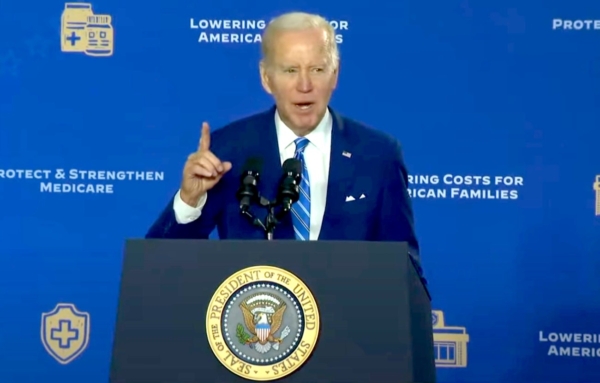People With Disabilities, Pre-Existing Conditions Are Vulnerable to Social Security & Medicare Cuts

All but the most upper-income seniors would be hurt by cuts to Social Security and Medicare — the kind which Republicans have been proposing in the name of “entitlement reform.” But older Americans with disabilities or pre-existing conditions would be hit especially hard. Whether these cuts apply to future generations or today’s seniors, they are unsustainable for the people these programs are designed to protect.
We reached out to our social media community to ask about the potential impact of Social Security and Medicare cuts. The testimonials we received were quite poignant – and to the point. “I live with depression, Graves disease, and COPD,” wrote a Facebook follower named Susan. “Without Medicare, I would be paying well over $500 dollars a month for medicine. If I don’t have medication to breathe, I will be a dead woman.”
Another Facebook user, Martin, is on Social Security Disability Insurance after suffering a head injury. “Social Security checks pay for my rent and utilities and internet. Without it, I couldn’t pay my bills,” he writes. Martin has seizures controlled by medication. “Medicare keeps my medical bills low,” he says.
Facebook user Natalie had a heart attack and suffers from COPD. She is severely disabled and bedridden. She wonders, if Social Security and Medicare are cut, “Who will pay for my rent and the utilities and my medications or groceries?”
For each of these stories, there no doubt are millions more across the country: Americans who worked hard and paid into Social Security and Medicare their entire lives, and now depend on those benefits for financial and physical survival.
Republicans insist that they have taken Social Security and Medicare cuts off the table in the debt ceiling debate. Even Senator Rick Scott (R-FL) backtracked on his 2022 proposal to ‘sunset’ all federal programs after five years, including Social Security and Medicare. He has introduced legislation to make it harder to cut either program.



“If cutting Social Security and Medicare is your dream, I’m your nightmare,” says President Biden.
This softening on the part of some Republicans is the result of political backlash to various GOP plans (of which Senator Scott’s original proposal was one of the most egregious) which would result in cuts to Americans’ earned benefits. These include: Senator Ron Johnson’s plan to switch Social Security and Medicare to “discretionary” rather than “mandatory” spending.; the House Republican Study Committee blueprint that would raise the retirement age, means-test benefits, and adopt a more miserly COLA formula; and the Cassidy-King plan to invest part of the Social Security trust fund on Wall Street, a scheme that would require benefit cuts in order for its math to add up.
After President Biden seemingly coaxed Republicans to agree on live tv not to cut Social Security or Medicare during the State of the Union, we wrote in a blog post that advocates do not consider seniors’ benefits to be completely safe. “It’s not like the verbal agreement at the State of the Union was signed in blood or anything,” observed Dan Adcock, our director of government relations and policy. “We’re not going to let our guard down.”
President Biden continues vigilant on this issue, as well, vowing to veto any legislation that would reduce senior’s benefits.
“I know that a lot of Republicans, their dream is to cut Social Security and Medicare. Well, let me say this: if that’s your dream, I’m your nightmare.” – President Biden, Tampa, FL,
Circling back now to older Americans with disabilities and pre-existing conditions, why would cuts to these programs impact them so dramatically? For one thing, many people with disabilities are unable to work. Disability makes older Americans more financially vulnerable, and often results in diminished income.
“Because of their disabilities and chronic health conditions, these people couldn’t save as much for retirement,” explains our senior policy advisor, Anne Montgomery, an expert in health advocacy and disability issues. “Their incomes may be more limited than healthier individuals.” A retiree named Lorraine told us via Facebook that she would be “out on the street” without her earned benefits.
Martin, whose testimonial we included above, is one of about 8 million people who receive Social Security Disability Insurance (SSDI) to remain financially secure. These beneficiaries cannot afford benefit cuts. (It should be noted that President Trump proposed cutting SSDI by billions of dollars in successive budgets his administration sent to Congress, even though Trump famously promised “not to touch” Social Security.)
There also are millions of disabled retirees on Social Security. They are among the nearly 50% of retirees who rely on Social Security for most of their income. Again, seniors with disabilities are likely to be less financially well-off than other retirees, making their monthly benefits all the more crucial.
Just as they rely on their retirement benefits for financial security, older people with disabilities and pre-existing conditions especially depend on Medicare for health security. Without Medicare, seniors with pre-existing conditions would not be able to purchase private insurance — or would have to pay exorbitant rates (also known as “age rating.”) This is the reason Medicare was created in the first place; too many retires couldn’t obtain coverage in the private insurance market.
As a Facebook follower named Wendy wrote, “Not only am I disabled, I was just diagnosed with breast cancer. My husband is deceased. If Medicare is cut, what do they expect me to do?”
“If Social Security and Medicare were cut, I wouldn’t have enough money to pay monthly expenses for food, housing, transportation, or medical expenses.” – Lois, Social Security and Medicare beneficiary, 2/23/23
A just-released Gallup poll indicates that nearly two-thirds of older Americans think the programs are “just fine the way they are.” The Gallup survey suggests that overall satisfaction with the programs has been increasing over the years.
“Social Security and Medicare are bedrock programs. They’ve been with us for a very long time,” says Anne Montgomery. “They should be safeguarded and shored up through common sense policy, without cutting benefits for current or future seniors.”
Nikki Haley’s Call for Mental Competency Tests Proves that Ageism is Alive and Well



Upon kicking off her presidential campaign this week, Nikki Haley said politicians 75 years of age or older should be subject to mental competency tests. It was a cheap political shot at President Biden and her rival in the primaries, Donald Trump. But it was more than that. Haley’s statement is blatantly ageist. Of course, of all the -isms (racism, sexism, able-ism, classism, etc.), the targeting of older people remains one of the most socially acceptable – probably leading Haley to believe that her jab at senior politicians was safe. That doesn’t make it any less offensive.
Haley’s comment was not an outlier. During a panel discussion Wednesday on CNN Tonight spurred by Haley’s remarks, pundit Patrick McEnroe complained that there are too many older politicians in Washington. There was no pushback from the rest of the panel, of which McEnroe and anchor Alisyn Camerota were by far the oldest members (at 56). Imagine if a CNN panelist (or presidential candidate) commented that there were too many members of a particular race or ethnic group — or people with disabilities — in politics. The pushback would have been intense and immediate. Not so for ageism. Apparently, it’s still okay.
President Biden is the target of almost daily ridicule and criticism about his age. Many pundits argue that he is simply “too old” to serve a second term. (Note that the Founding Fathers did not impose an upper age limit on eligibility for the Presidency, only a lower one – 35 years of age.) While President Biden may suffer from verbal gaffes, a speech impediment, and some memory lapses, his chronological age should not disqualify him from serving a second term.
Age and hard-earned wisdom should be considered an asset in politics. As writer Jack Goldstone noted in the Financial Review “A leader with decades of experience is likely to have encountered various crises before and to know how to respond effectively.” To this point, the mainstream media were rightly impressed when President Biden skillfully baited Republicans into agreeing not to cut Social Security and Medicare as part of the debt ceiling debate during the State of the Union. Pundits correctly noted that his five decades as a politician and public office holder equipped him with the skills to outsmart the opposition on live tv in front of millions of viewers.
Rather than being judged by his chronological age, the President should be assessed by his performance in office, including his list of legislative accomplishments and handling of both domestic and foreign policy crises. Primary and general election voters should decide for themselves whether he is competent and fit to serve, not ageist candidates and pundits.
Unfortunately, the ageism directed at President Biden is typical. Despite their enormous contributions to our country, seniors are continually devalued as members of society. When someone calls another person “old,” it’s understood as an insult, not a sign of respect.
“In our society, older people too often are considered to be absent and invisible,” says our senior policy expert, Anne Montgomery, a longtime advocate for seniors and people with disabilities. “There are other cultures, though, where you are considered more important as you get older. The elderly have lived longer and accumulated wisdom that is useful to society.”
She’s right. In the U.S. and some other Western societies, “elder” is a bad word instead of a sign of respect. “Ageism is everywhere – in the workplace, in media, in Hollywood, in schools and in health care, and it is something that most everyone will experience at some point in their lives,” writes Michele Dinman of the Harvey A. Friedman Center for Aging at Washington University in St. Louis.
Ageism is not a benign phenomenon. According to Dinman, older adults experience discrimination in employment, housing, health care, and in their daily lives. In a 2019 survey, 82% of older adults said that they “regularly experienced at least one form of everyday ageism.”
The consequences are real. As Dinman writes, ageism can lead to poor physical health and shorten lives. It also can lead to “increased social isolation and loneliness.” In 2021, the World Health Organization reported that ageism can cost society billions of dollars in lost productivity and opportunity.
So, what about the claim that older politicians shouldn’t hold high public office? There have been plenty of members of Congress who have served admirably – and in lofty leadership positions – well into their late 70s and 80s. Rep. Maxine Waters (D-CA) is 84. Rep. Bill Pascrell (D-NJ), an outspoken member of the House Social Security Subcommittee, is 86. Former House Speaker and current congresswoman Nancy Pelosi (D-CA) is 82. Legendary Congressman and voting rights crusader John Lewis (D-GA) served nobly until he died at age 80.
On the other side of the Capitol, Senator James Inhofe (R-OK) is 88. Senator Chuck Grassley (R-IA) is 89. Senator Bernie Sanders (I-VT) is 81. Some of these members of Congress are controversial, but arguably fully mentally competent and more than capable of representing their constituents and leading their colleagues.
When considering elder lawmakers of years past, we remember former House Speaker Tip O’Neill (who retired in his mid 70s), powerhouse Michigan Rep. John Dingell (D-MI) (who stepped down at 87), or former Senator John Glenn (D-OH), who served until he was 77 and flew on the space shuttle that same year!
On the flip side, there have been plenty of members of Congress whose mental acuity is questionable, regardless of age. When we tweeted about Nikki Haley’s ageist comment, one of our followers aptly responded: “Then we need competency tests for ALL of them!”
There are myriad examples of highly accomplished seniors who have been leaders in their respective fields:
Warren Buffett, business magnate, investor, philanthropist (92)
Fran Gehry, legendary architect (93)
LaDonna Harris, Native American leader/activist (91)
Jasper Johns, world-renowned artist (92)
Ralph Lauren, fashion mogul (83)
Norman Lear, tv producer/creator of “All in the Family” (100)
George Takei, actor and activist (85)
Gloria Steinem, feminist writer and activist (88)
To the best of our knowledge, no one has demanded that these leaders step down or take mental competency tests. If they can continue doing what they do well into their 80s and 90s, why shouldn’t the President of the United States, surrounded as he (or she) is with an immense support infrastructure, from White House staff to advisors and cabinet members? In the year 2023, it is time for our society to re-examine its biases toward seniors. If racism, sexism, able-ism and all the other “isms” have no place in a society striving for tolerance, then neither should ageism.
Walter Gottlieb is Director of Communications at the National Committee to Preserve Social Security and Medicare
Are Social Security and Medicare Suddenly Safe? Not by a Long Shot.



During Tuesday’s State of the Union, President Biden coaxed Republicans to agree to take Social Security and Medicare cuts “off the table” in the debt ceiling standoff. It was an impressive piece of real-time negotiation on the president’s part – on live tv no less! But does that mean seniors’ earned benefits are suddenly safe from GOP assault? The short answer is: not by a long shot.
As our legislative director, Dan Adcock, told the Washington Examiner, “I think the way the president played it was masterful in getting Republicans to make that commitment, but it was not like it was signed in blood, either.”
Adcock says that seniors’ advocates are not going to let their guard down simply because Republicans applauded during a speech for not cutting Social Security and Medicare. For one thing, the moment of apparent consensus came right after MAGA members, led by Rep. Marjorie Taylor Greene (R-GA), accused President Biden of ‘lying’ when he said that “some Republicans” want to sunset both programs after five years. He was referring to a plan from Sen. Rick Scott (R-FL) that would do exactly that.
Therein lies the problem. Republicans’ definition of what constitutes “cutting” Social Security and Medicare is somewhat squirrelly. Senator Scott’s plan is only the most glaring example. Obviously, any proposal that subjects Social Security and Medicare to an up or down vote every five years could potentially cut – if not END – both programs. Scott spent the rest of the week after the State of the Union defending his plan and, for good measure, repeating his false claim that the Inflation Reduction Act cut Medicare (when, in fact, it saved Medicare billions of dollars.)
If Scott’s proposal were the only one, advocates may not be as worried. But there are other GOP plans that would jeopardize seniors’ earned benefits. Many of those have come to the fore during the debt ceiling standoff.
The House Republican Study Committee’s 2022 budget blueprint – endorsed by more than 180 GOP members of Congress – contained outright benefit cuts. It would raise the Social Security full retirement age to 70, slashing lifetime benefits for some seniors by more than 20%. The GOP blueprint also would reduce annual cost-of-living adjustments (COLAs) and means-test benefits. All of those are cuts, plain and simple.
As Arthur Delaney of the Huffington Post pointed out this week, Republicans seem to have a very different definition of the word “cut.”
When Republicans say they oppose benefit cuts, there’s an important caveat – they’re often referring to cuts that wouldn’t affect current retirees or people near retirement, such as Americans older than age 54. – Huffington Post, 2/8/23
First of all, any reduction in COLAs (which multiple Republican proposals include) would impact current beneficiaries immediately. Secondly, slashing benefits for future retirees is a cut – even if it doesn’t affect today’s seniors. As we have pointed out many times, younger adults will rely on their Social Security and Medicare benefits even more than their parents and grandparents do now. Many of the GOP’s “entitlement reform” plans definitely would impact Gen Z, Millennials and some Gen X’ers when they retire.
“All of the evidence is that they want to do things like increase the retirement age. That is cutting Social Security… But they’re in a box because it’s highly unpopular.” – Pramila Jayapal (D-WA), 2/8/23
Yes, public polling consistently shows that bipartisan majorities of voters oppose benefit cuts. But they overwhelmingly support bringing more revenue into the program. Democrats introduced legislation in the last Congress to keep Social Security’s trust fund solvent by adjusting the payroll wage cap so that the wealthy contribute their fair share. Of all the solutions that Republicans favor, they apparently cannot stomach any revenue increases – no matter how equitable – which leaves them with one option: cut benefits. That is why, as Dan Adcock put it, “We’re not going to let our guard down” anytime soon.
Ageism is Alive and Well



Upon kicking off her presidential campaign this week, Nikki Haley said politicians 75 years of age or older should be subject to mental competency tests. It was a cheap political shot at President Biden and her rival in the primaries, Donald Trump. But it was more than that. Haley’s statement is blatantly ageist. Of course, of all the -isms (racism, sexism, able-ism, classism, etc.), the targeting of older people remains one of the most socially acceptable – probably leading Haley to believe that her jab at senior politicians was safe. That doesn’t make it any less offensive.
Haley’s comment was not an outlier. During a panel discussion Wednesday on CNN Tonight spurred by Haley’s remarks, pundit Patrick McEnroe complained that there are too many older politicians in Washington. There was no pushback from the rest of the panel, of which McEnroe and anchor Alisyn Camerota were by far the oldest members (at 56). Imagine if a CNN panelist (or presidential candidate) commented that there were too many members of a particular race or ethnic group — or people with disabilities — in politics. The pushback would have been intense and immediate. Not so for ageism. Apparently, it’s still okay.
President Biden is the target of almost daily ridicule and criticism about his age. Many pundits argue that he is simply “too old” to serve a second term. (Note that the Founding Fathers did not impose an upper age limit on eligibility for the Presidency, only a lower one – 35 years of age.) While President Biden may suffer from verbal gaffes, a speech impediment, and some memory lapses, his chronological age should not disqualify him from serving a second term.
Age and hard-earned wisdom should be considered an asset in politics. As writer Jack Goldstone noted in the Financial Review “A leader with decades of experience is likely to have encountered various crises before and to know how to respond effectively.” To this point, the mainstream media were rightly impressed when President Biden skillfully baited Republicans into agreeing not to cut Social Security and Medicare as part of the debt ceiling debate during the State of the Union. Pundits correctly noted that his five decades as a politician and public office holder equipped him with the skills to outsmart the opposition on live tv in front of millions of viewers.
Rather than being judged by his chronological age, the President should be assessed by his performance in office, including his list of legislative accomplishments and handling of both domestic and foreign policy crises. Primary and general election voters should decide for themselves whether he is competent and fit to serve, not ageist candidates and pundits.
Unfortunately, the ageism directed at President Biden is typical. Despite their enormous contributions to our country, seniors are continually devalued as members of society. When someone calls another person “old,” it’s understood as an insult, not a sign of respect.
“In our society, older people too often are considered to be absent and invisible,” says our senior policy expert, Anne Montgomery, a longtime advocate for seniors and people with disabilities. “There are other cultures, though, where you are considered more important as you get older. The elderly have lived longer and accumulated wisdom that is useful to society.”
She’s right. In the U.S. and some other Western societies, “elder” is a bad word instead of a sign of respect. “Ageism is everywhere – in the workplace, in media, in Hollywood, in schools and in health care, and it is something that most everyone will experience at some point in their lives,” writes Michele Dinman of the Harvey A. Friedman Center for Aging at Washington University in St. Louis.
Ageism is not a benign phenomenon. According to Dinman, older adults experience discrimination in employment, housing, health care, and in their daily lives. In a 2019 survey, 82% of older adults said that they “regularly experienced at least one form of everyday ageism.”
The consequences are real. As Dinman writes, ageism can lead to poor physical health and shorten lives. It also can lead to “increased social isolation and loneliness.” In 2021, the World Health Organization reported that ageism can cost society billions of dollars in lost productivity and opportunity.
So, what about the claim that older politicians shouldn’t hold high public office? There have been plenty of members of Congress who have served admirably – and in lofty leadership positions – well into their late 70s and 80s. Rep. Maxine Waters (D-CA) is 84. Rep. Bill Pascrell (D-NJ), an outspoken member of the House Social Security Subcommittee, is 86. Former House Speaker and current congresswoman Nancy Pelosi (D-CA) is 82. Legendary Congressman and voting rights crusader John Lewis (D-GA) served nobly until he died at age 80.
On the other side of the Capitol, Senator James Inhofe (R-OK) is 88. Senator Chuck Grassley (R-IA) is 89. Senator Bernie Sanders (I-VT) is 81. Some of these members of Congress are controversial, but arguably fully mentally competent and more than capable of representing their constituents and leading their colleagues.
When considering elder lawmakers of years past, we remember former House Speaker Tip O’Neill (who retired in his mid 70s), powerhouse Michigan Rep. John Dingell (D-MI) (who stepped down at 87), or former Senator John Glenn (D-OH), who served until he was 77 and flew on the space shuttle that same year!
On the flip side, there have been plenty of members of Congress whose mental acuity is questionable, regardless of age. When we tweeted about Nikki Haley’s ageist comment, one of our followers aptly responded: “Then we need competency tests for ALL of them!”
There are myriad examples of highly accomplished seniors who have been leaders in their respective fields:
Warren Buffett, business magnate, investor, philanthropist (92)
Fran Gehry, legendary architect (93)
LaDonna Harris, Native American leader/activist (91)
Jasper Johns, world-renowned artist (92)
Ralph Lauren, fashion mogul (83)
Norman Lear, tv producer/creator of “All in the Family” (100)
George Takei, actor and activist (85)
Gloria Steinem, feminist writer and activist (88)
To the best of our knowledge, no one has demanded that these leaders step down or take mental competency tests. If they can continue doing what they do well into their 80s and 90s, why shouldn’t the President of the United States, surrounded as he (or she) is with an immense support infrastructure, from White House staff to advisors and cabinet members? In the year 2023, it is time for our society to re-examine its biases toward seniors. If racism, sexism, able-ism and all the other “isms” have no place in a society striving for tolerance, then neither should ageism.
Walter Gottlieb is Director of Communications at the National Committee to Preserve Social Security and Medicare
Raising the Social Security Retirement Age is a Benefit Cut



In recent weeks, several of our social media commenters have challenged us to “NAME ONE REPUBLICAN PROPOSAL TO CUT SOCIAL SECURITY AND MEDICARE!” OK, how about: Senator Rick Scott’s proposal that Social Security and Medicare be subject to and up or down vote every five years? That could not only cut these programs, but potentially end Social Security and Medicare as we know them; Senator Ron Johnson’s proposal to change Social Security and Medicare from “mandatory” to “discretionary” spending programs – subjecting them to the volatility of annual budget negotiations; and the House Republican Study Committee’s 2022 blueprint, which would reduce Social Security COLAs and means test benefits.
But none of these plans would cut benefits as blatantly as GOP proposals to raise the Social Security full retirement age from 67 to 70. This would amount to a 23% lifetime benefit cut for some seniors. Why? Because when you claim Social Security before full retirement age, your monthly benefits are permanently reduced.
Conservative backers of this idea insist that life expectancy has increased and people are able to continue working and earning income well into their 60s, so no harm, no foul. Except that neither is really true. Life expectancy for many demographic groups has actually decreased in the past few years, especially for communities of color. Secondly, Americans in physically demanding jobs may not be able to continue working until age 70. They would have no choice but to claim benefits early and lose sorely-needed income.
The L.A. Times’ Michael Hiltzik drives home this point in a column aptly entitled, The Stupid and Dishonest Idea of Raising the Social Security Retirement Age is Back:
“As for whether it’s ‘easier’ to work into one’s 70s than it used to be, that may be true for authors of think tank papers in air conditioned offices, but not for the millions of Americans who spend their careers hauling, digging, driving and building…” – Michael Hiltzik, Los Angeles Times, 2/2/23
The proposal’s backers insist that something must be done to shore up Social Security’s finances before the projected 2035 insolvency date of the program’s trust fund – and raising the retirement age would save money. A key House Republican told the Washington Post‘s Tony Romm:
“We have no choice but to make hard decisions.” – Rep. Kevin Hern (R-OK), chair of the House Republican Study Committee
For conservatives, those “hard decisions” always seem to demand that seniors bear the burden through benefit cuts, rather than by bringing more revenue into the program. Democrats have introduced legislation do increase revenue by adjusting the payroll wage cap — so that high-earners begin contributing their fair share to Social Security. That alone could extend the solvency of the trust fund for decades. (Later this month, millionaires will stop paying into Social Security for the rest of the calendar year.)
Not a single GOP member of Congress has signed onto legislation to adjust the payroll wage cap. Instead, key Republicans insist that “entitlements” (Social Security and Medicare) must be reformed.
“GOP lawmakers have been counseled by a wide array of right-leaning groups, including the Heritage Foundation, that the new majority should consider significant changes to entitlements as part of their commitment to cutting spending and balancing the budget.” – Washington Post, 1/24/23
Many congressional Republicans conflate seniors’ earned benefits with the federal debt issue, even though Social Security and Medicare Part A are completely self-funded by American workers and employers. They don’t contribute a penny to the debt. None other than Ronald Reagan declared in 1984, “Social Security has nothing to do with the deficit.”
According to the Center on Budget and Policy Priorities, the number one driver of the debt is tax breaks. But Republicans ignore the $2 trillion that the Trump/GOP tax cuts added to the debt. Instead of calling for repeal of those tax cuts, the GOP wants to make them permanent. This is a dubious set of priorities at a time when the wealthy and profitable corporations are by and large thriving, while some seniors — racked by the pandemic and high inflation — are barely surviving.


